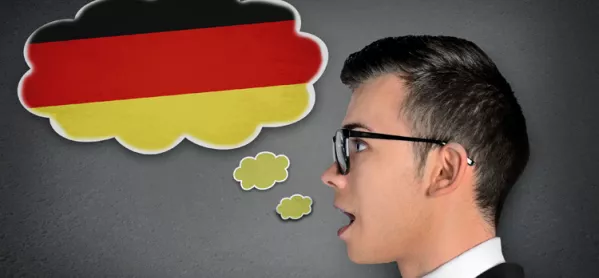- Home
- We’re losing the language of Goethe, Bach and handshoes
We’re losing the language of Goethe, Bach and handshoes

Auf Wiedersehen, Deutsch! After 27 years of sharing my love of all things German with thousands of students aged 11-18, I spent this summer shredding materials, donating books and binning years of precious resources.
In June, I taught my last-ever German lesson. From this September, in addition to my senior leadership role, I will teach only French. It is with a deep sense of regret that I have had to accept that the subject I fell in love with aged 11 - the language of the country I have lived and worked in, travelled extensively around and developed in as a person - will never again appear on my timetable. Nor will it be formally taught at a school whose values and sense of moral purpose I feel equally passionate about.
As a former head of German, I remain as committed as ever to the importance of teaching languages in our schools. But, as a school leader and manager, I also understand the financial challenges facing schools. Once my own school lost its language-college funding a few years back, our language department could no longer afford the luxury of offering three languages to pupils.
The decision to drop German was driven by numbers, staffing expertise and tightening budgets, and the benefit of learning German was not able to be a consideration.
Second souls
We fought a hard battle to retain German. We reduced our time allocation at key stage 5 to sustain smaller group sizes. We joined forces with the history department to introduce a popular Berlin trip. We delivered assemblies, organised cultural events and set up a key stage 3 German club, but to no avail.
Our school’s decision merely reflects a national trend. GCSE entries in German were down by 12.5 per cent since last year. Coupled with declining numbers at A level and fewer applicants at university level, this means we no longer have the pipeline of teachers entering the profession. We will soon lose our ability to teach certain languages, and German will disappear from our state schools in the same way Latin did.
Soon there will be a shortage of language skills in general among our young people. This will mean the loss of more than just our ability to converse. To quote Charlemagne: “To have another language is to possess a second soul.”
I believe we nurture those second souls in our teaching of languages. The decision to learn a foreign language is an act of self-care and personal discovery. It’s not just a route to better communication, but also an opportunity to get to know yourself better and to consider your values and your culture, the way you operate and think.
Warmth, efficiency and compound nouns
What drew me in at age 11, and gained my appreciation when living in Germany in my twenties, was the clarity of the language, the warmth but efficiency of the people, the rich culture and intellect of the German soul, and the punctuality and reliability of absolutely everything. I still insist on all our electrical appliances at home being German, and I’ve never been let down yet by the reliability of German engineering.
The Germans have a reputation for lacking a sense of humour, although one has only to watch their annual New Year’s Eve sketch Dinner for One to realise this is unfair. There is also a lot of fun to be had with the German language, not least the love of compound nouns. My students used to enjoy assembling huge words, to compete with the longest words in the German language - words like the 41-lettered Donaudampfschiffahrtsgesellschaftskapitän (Danube steamship company captain).
But, for all its long words, many German words and phrases show a beautiful simplicity and clarity. The German language relies heavily on the simple power of monosyllables. Compound nouns put two words together, rather than creating a new word: for example, Handschuh (“hand-shoe” for “glove”).
The limits of the world
The German language pervades much of British culture. We use German so often in our everyday lives that we don’t always notice it. And so many of our Christmas traditions - the Christmas tree, the carol Silent Night (Stille Nacht) - also hail from German roots.
Germans have made tremendous contributions to classical music, and the traditions of famous German or Austrian composers such as Bach, Mozart, Beethoven, Brahms, Wagner and Mahler live on today.
If we look at the statistics, approximately 100 million people in the world speak German. German is the most widely spoken language in the European Union, and has its roots from the West Germanic family, to which English also belongs, rather than the Latin family, like French.
By teaching German, by spreading understanding of German culture and life, and maintaining our links with this important partner in trade, we will be helping to keep the current European argument civilised, open and decent. We will continue to keep this country’s young people open-minded and willing to embrace other languages and cultures.
As Wittgenstein said: “The limits of my language mean the limits of my world.” I hope I have taught all my German students over the past 27 years to learn as much as possible about the richness of this wonderful and varied world in which we live.
Hayley Gray is a secondary languages teacher
Keep reading for just £1 per month
You've reached your limit of free articles this month. Subscribe for £1 per month for three months and get:
- Unlimited access to all Tes magazine content
- Exclusive subscriber-only stories
- Award-winning email newsletters